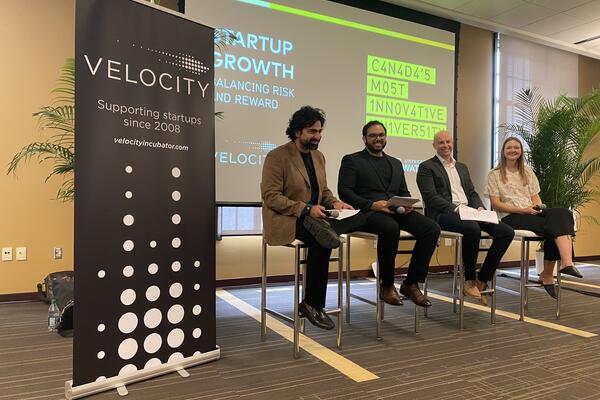
How to disrupt industries using generative AI
Waterloo AI experts lead a masterclass at Collision on how business leaders can unlock the transformative potential of LLMs

Waterloo AI experts lead a masterclass at Collision on how business leaders can unlock the transformative potential of LLMs
By Stephanie Longeway University Relations“Unless you’ve been living under a rock for the past eight months, you’ve heard about ChatGPT,” said Jimmy Lin, professor and Cheriton chair in the David R. Cheriton School of Computer Science at the University of Waterloo.
“It is the fastest growing consumer application in history reaching more than 100 million active users in less than two months. For reference, it took Tik Tok a whole nine months and Instagram two and a half years to reach the same threshold.”
The historic growth in popularity and access to generative AI technologies like ChatGPT and Bard are quickly changing the way we work. Waterloo’s WatSPEED hosted a masterclass at Collision 2023 to unpack the meteoric rise of ChatGPT, and other large language models (LLM) like it, to provide a strategy for entrepreneurs and business executives to unlock its transformative potential.
Read individual Tweet on Twitter
Lin led the session alongside Joel Blit, professor in the Faculty of Arts. Blit said that the biggest lesson we can take from history about general-purpose technologies is that it “takes decades to truly feel their impact.”
But LLMs have been around for about 10 years, so “we are truly at an inflection point … it’s about to explode,” Blit added.
Lin discussed the three phases that all general-purpose technologies go through. The first is “replace”, when a new technology displaces old technology or humans. The second is “reimagine”, when processes and business models fundamentally change to leverage the new technology. And the third phase is, “recombine,” when the technology is combined with other new or existing technologies to create a completely new use case or application.
“Think about computers,” Lin said. When they first came out, they replaced tasks that humans did manually, then businesses began changing their operations to make computers ubiquitous in their company processes. Then came smartphones and the internet — truly revolutionizing how we use computers today.
Blit pointed out that we are currently in phase one of LLMs, and savvy business leaders should break down workflows into tasks and identify what can be automated — tasks like content generation, retrieval and synthesis. But if you want to be innovative and outpace your competition, leaders need to move to phase two quickly and reimagine how they will do business.
Blit added that phase three may still be a way off, but when it emerges, “this is where we are going to see the next big companies come [to market] … this is where the next Amazon, Facebook or Google will emerge.”
The masterclass left no doubt that we are on the precipice of a significant shake-up in our economy and society as we begin reimagining AI technology in the workplace. It’s a change that Blit and Lin said only comes once or twice in a generation, and there will be winners and losers.
Blit shared the example of how Amazon leveraged the internet boom to begin selling books online — fundamentally reinventing the retail industry as we know it.
Blit’s key takeaway for the crowd of more than 130 attendees was clear:
“There is now a once in a generation opportunity to truly transform your business and disrupt your industry, or someone else’s industry.”
Read individual Tweet on Twitter
Waterloo has always been at the forefront of developing talent for the future. The University’s WatSPEED program offers professional education to support the leaders of today navigate an ever-changing environment. Programming, like this masterclass on generative AI, enable executives and industry professionals to keep pace with emerging technologies and understand their impact on businesses, economies, the environment and societies.

Read more
Experts from Velocity share insights on how to successfully grow a business at Collision

Read more
Waterloo hosts a masterclass at Collision on new approaches to responsible technology development

Read more
Meet the five exceptional graduate students taking the convocation stage as Class of 2024 valedictorians
The University of Waterloo acknowledges that much of our work takes place on the traditional territory of the Neutral, Anishinaabeg, and Haudenosaunee peoples. Our main campus is situated on the Haldimand Tract, the land granted to the Six Nations that includes six miles on each side of the Grand River. Our active work toward reconciliation takes place across our campuses through research, learning, teaching, and community building, and is co-ordinated within the Office of Indigenous Relations.